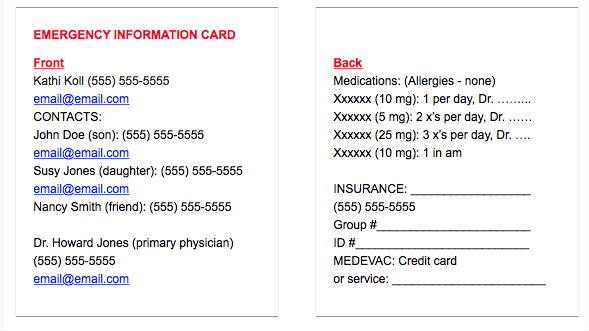The last thing anyone wants to do when planning a vacation is anticipate a medical emergency. Whether you’re in a faraway land or in your very own back yard, some planning can save your life and help those caring for you. Most of us realize that being a patient can happen when we least expect it. Hardly anyone focuses on the other side of the coin. One can become a caregiver overnight too!
Most recently, a surprise emergency happened to a friend of mine while she and her husband were vacationing in Mexico. They weren’t prepared for what became a very serious medical situation. To say the least, they were all thumbs.
“You think it’ll never happen to you,” my friend’s husband shared with me. “How could it? We’re healthy, fit, and don’t have any serious medical problems. Well, if it can happen to us, and it did, it can truly happen to anyone.”
One could call it the perfect storm. My girlfriend almost died. Everything that my friends were not prepared for, as most of us aren’t, happened like a tsunami hitting a peaceful shore. Before my friend could give her husband or the doctors answers to easy medical questions, she was unconscious, leaving them scrambling for answers. They needed to know what medications she took, who her primary doctor was, and whether she had medevac insurance. It took quick action by family and friends to get the answers to these questions.
To make a serious situation even worse, my friends were guided by their five-star resort to an ill-equipped clinic, instead of the highly regarded, nearby hospital. Her situation was deteriorating by the hour until her husband nervously questioned her care, and insisted she be transferred to the accredited hospital.
During 10 harrowing days, many lessons were learned. The most important was to make sure to have as much medical and personal information available to assist a hospital team. Below is a list of fundamental information, which I recommend you carry with you at all times, but especially when traveling. It can make a difference in a doctor’s ability to provide quality care and thus could give you a head start in handling a medical emergency:
1) Create an Emergency List
Keep this list with you at all times. I’ve laminated mine and keep it in my wallet next to my driver’s license. The list should consist of the following information:
• Phone numbers and email addresses of important contacts (My list consists of my children, primary doctor, and my own personal contact information. If you don’t have a personal doctor now is the time to engage one. Having a primary doctor who is familiar with your health history is vital.)
• Medications, including strength, dosage, and prescribing doctor.
Insurance company with phone number, group number, and ID number.
• Credit card number, especially if you have a card that offers medevac service
•Travel insurance details.
2) Consider Guardian Angels
When traveling, consider people you might know in the area or friends who might have traveled there previously, as the information might come in handy in an emergency. Or perhaps you have friends at home who might be able to help in an emergency, such as by contacting local hospitals and doctors in order to arrange an emergency medevac, which is what my friend eventually required.
3) Confirm Travel Insurance
There are companies all over the world that issue travel insurance to help in the event of an emergency, so do a web search to see what might be available on your journey. Check whether your credit cards might offer similar benefits. You might already have coverage you didn’t realize.
4) Check Out Apps on Your Mobile Phone
Some apps provide a way to store medical records and trigger medical alerts. Type in Medical Emergency ID in your App Store search engine, and you’ll see several choices—both free or for a small fee. Some also provide specialized services. For example, ICE Angel will alert your loved ones in case of an emergency and also provide them with needed medical information, while MedicalMe alerts the people in your vicinity that you’re suffering from a medical emergency and lists on-screen health notices that can be read without unlocking your phone.
Your vacation should be a vacation, not a medical emergency, so be prepared. My friend suggested, “Be a little bit of a hypochondriac, especially once you pass 55 and are about to leave town. That little pain, mole, thingy that’s getting worse is telling you something. Listen and act. And when it’s nothing, be happy.” —Kathi Koll
P.S. Here’s an example of my Emergency Information Card. Click here to download your own.



